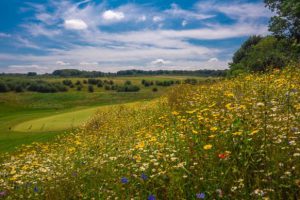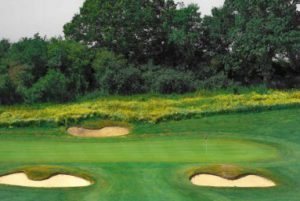Bloomin’ marvellous: Farleigh has improved its environment for wildlife, and for golfers
Farleigh golfers get a buzz out of joining the Pollinator project
Farleigh Golf Club has reaffirmed its commitment to sustainability and environmental initiatives by completing the development of two areas of wildflowers on the course as part of the Operation Pollinator programme.
The areas of growth around the seventh hole on the red loop and third hole on the blue – the Selsdon course has three loops of nine holes each – are now blooming and complete the first step of the scheme. The second stage will see further development and plantation across other areas of the course throughout this winter.
In total, Farleigh’s commitment to the programme will see it move towards establishing at least 0.5 hectares of new wildflower habitat around the golf course as it looks to provide more outstanding habitats and food sources for a range of native bees and other pollinating insects.
Operation Pollinator provides the experience and advice to help landowners and farmers replace habitats essential for all pollinating insects, and claims to be one of the world’s leading environmental initiatives.
Research shows that the creation of even small areas of dedicated habitat can significantly increase numbers of pollinating insects. Bumblebee numbers are continuing to decline, with some bee species on the verge of extinction in Britain. And these pollinating bees make up a fundamental part of the natural ecosystem with their pollination of food crops.
Golf courses occupy approximately 150,000 hectares of land across the country.
Farleigh Golf Club is set in 350 acres of picturesque countryside in the North Surrey Downs, and so could play a vital role in providing pockets of sanctuary for wildlife.
“With so much land, flora and vegetation, it would be almost selfish of us not to share this with the animals and insects which are so vital to our environment,” said James Ibbetson, Farleigh’s general manager.
“By creating the best possible habitat for them to continue their essential cycling of nutrients, pollination, dispersion of seeds, as well as maintaining soil structure and fertility, all of which is beneficial to the world and the golf course, we’re doing our bit to hopefully prevent the extinction of some of our critical pollinating insects, such as bumblebees, and continue the growth of grass and crops.
“I’d like to congratulate and thank our excellent greenkeeping team who have worked hard to bring this project to life.”
Farleigh golfers get a buzz out of joining the Pollinator project | Inside Croydon










